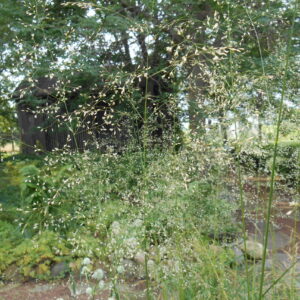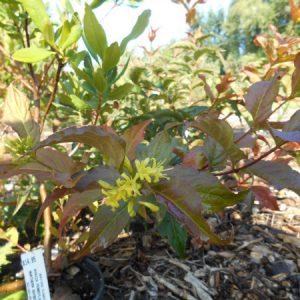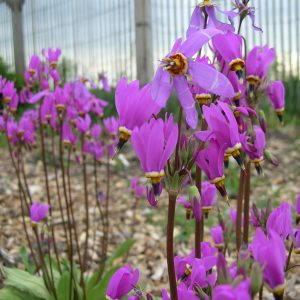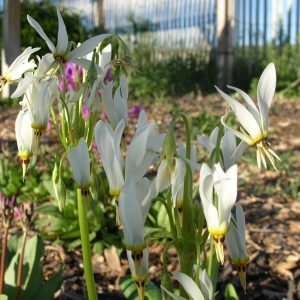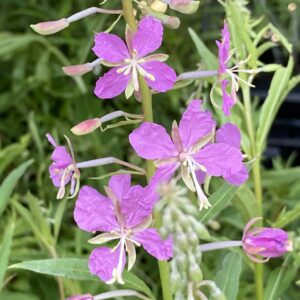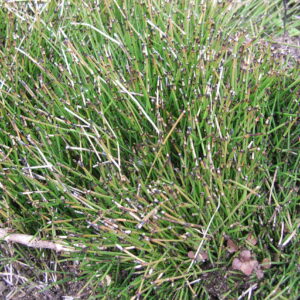Wisconsin Native
Showing 41–48 of 107 results
-
Deschampsia caespitosa Hair grass Z 4-9
Airy pink panicles, like delicate billowing clouds of seed heads, top clumps of arching slender leaves in mid- summer persisting through winter.
Airy pink panicles like delicate billowing clouds of seed heads, top clumps of arching slender leaves in mid-summer persisting through winter.
Size: 2-4' x 18"
Care: moist soil in sun to shade
Native: Europe, Asia & No. America, Wisconsin nativeDeschampsia named for French botanist Deslongchamps (1774-1849.) Caespitosa means that it grows in clumps. This species found by mid-1700’s.
-
Diervilla lonicera Northern bush honeysuckle Z 3-7
Lemon yellow flowers on this short shrub June to August. In fall its foliage turns dark red for the final fireworks’ display. Great shrub for tough, dry shady areas.
Lemon yellow flowers on this short shrub June to August. In fall its foliage turns dark red for the final fireworks’ display.
Size: 3’ x 3’ spreading
Care: sun to part shade in well-drained soil, drought tolerant
Native: Eastern half of US & Canada, Wisconsin native.
Wildlife Value: nectar source for Bumblebees. Birds make nests from the branches and eat the fruitsUsed medicinally by numerous Native Americans – Algonquin, Chippewa, Cree, Iroquois, Menominee, Meskwaki, Ojibwa and Potawatomi. Used as remedy for sore eyes, diuretic, “old men who cannot retain urine,” constipation, stomach pain, increase breast milk, to “spoiled babies with adulterous mother,” STD’s and vertigo. Dr. N. Dierville, a surgeon, carried this to France from Canada (then Acadia) in 1699. Botanist to France’s king, Louis XIV, Joseph Pitton de Tournefort (1656-1708) named this to honor Dierville
**LISTED AS OUT OF STOCK BECAUSE WE DO NOT SHIP THIS ITEM. IT IS AVAILABLE FOR PURCHASE AT OUR RETAIL LOCATION.
-
Dodecatheon meadia syn. Primula meadia Pink Shooting Star Z 4-8 Ephemeral
Rosy-lilac reflexed flowers, looking like a descending shuttlecock, dangle from stems in spring
Only available for purchase in spring – Ephemeral
Rosy-lilac reflexed flowers, looking like a descending shuttlecock, dangle from stems in spring
LIMITED QUANTITIES AVAILABLE. LIMIT OF 1 PER CUSTOMER PLEASE.
Size: 12-24” x 6-12”
Care: sun to part shade in moist well-drained soil.
Native: PA to Wisconsin, south to TX.
Awards: Royal Horticultural Society Award of MeritName Dodecatheon from the Greek dodeka (twelve) and theos (gods), meaning 12 superior gods, after the name given to another plant by Roman author, Pliny the Elder. The species name meadia after Richard Mead, physician to George III. John Tradescant the Younger sent this to England by 1640. “A favorite among old border flowers.” William Robinson, 1899.
-
Dodecatheon meadia syn. Primula meadia Shooting Star Z 4-8 Ephemeral
White reflexed flowers, looking like a descending shuttlecock, dangle from stems in spring. Ephemeral. Let it drop its seed and in three years you will have more. There are pink ones but not as vigorous, rare.
Available to order in Spring only
White reflexed flowers, looking like a descending shuttlecock, dangle from stems in spring. Ephemeral. Let it drop its seed and in three years you will have more. There are pink ones but not as vigorous, rare.
Size: 12” x 6”
Care: sun to part shade in moist well-drained soil
Native: PA to Wisconsin, south to TX.
Awards: Royal Horticultural Society Award of Merit.Dodecatheon from the Greek dodeka (twelve) and theos (gods), meaning 12 superior gods, after the name given to another plant by Roman author, Pliny the Elder. The species name meadia after Richard Mead, physician to English King George III. John Tradescant the Younger sent this to England by 1640. “A favorite among old border flowers.” William Robinson, 1899. This showy native can be found in open woodland, prairies, meadows, and on rocky slopes in the eastern United States. Introduced into European gardens as early as 1704, Philadelphia nurseryman and explorer John Bartram described this species of Dodecatheon in 1783. The white version was offered, along with several in shades of purple, by Long Island’s Prince Nursery in 1857.
-
Echinacea pallida Pale purple coneflower Z 4-8
Narrow, weeping pink rays in early summer surround hedgehog-like cone.
Narrow, weeping pink rays in early summer surround hedgehog-like cone.
Size: 2' x 14"
Care: Full sun in well-drained soil.
Native: much of continental US east of Colorado
Wildlife Value: attracts bees including bumblebees and caterpillars of some Skippers and a few moths. In fall finches eat the seeds. Deer resistant
Awards: Great Plants for Great PlainsEchinacea is Greek meaning hedgehog referring to the bristly conehead. Used to cure many ailments – arthritis, rheumatism, burns, colds, boils, fever, sore mouths, throats & gums, toothaches, snakebites, headaches, stings and distemper in horses – by several tribes – Cheyenne, Crow, Dakota and Sioux. 1st collected by Englishman Thomas Nuttall (1786-1859) who searched much of No. America finding thousands of new plants.
-
Epilobium angustifolium syn. Chamaenerion angustifolium Fireweed Z 2-7
Bright pink to lilac purple flowers June-July atop red stems covered in willow-like leaves
Bright pink to lilac purple flowers June-July atop red stems covered in willow-like leaves.
Can be slow to establish – be patient!
Size: 2-6’ x 3’ spreading
Care: Sun to part shade in dry to moist well drained soil
Native: Circum-polar to the temperate northern hemisphere. Wisconsin native.
Wildlife Value: Attracts hummingbirds, bees, and butterflies. Host for caterpillars of Fireweed Clearwing moth and Nessus Sphinx mothCommon name comes from its quick reappearance after a wildfire. Native Americans used fireweed externally for burns and other skin conditions, and made a tea for gastro-intestinal and bronchial problems. Its shoots eaten as a vegetable and young leaves added to salads. Fireweed yields a honey so prized that some Canadian beekeepers drive – or even fly – their hives to areas rich in fireweed for the blossoming season. Described and named by 1753.
-
Equisetum scirpoides Dwarf horsetail Z 3-11
Short, bamboo-like - Black bands show joints of green stems, no showy flowers
OUT OF STOCK
Short,bamboo-like – Black bands show joints of green stems, no showy flowers
Size: 6” x spreads – invasive in moist soil if not planted in pots sunk in the ground
Care: full sun, moist to wet soil
Native: all North America – incl. Arctic - north of ILCollected by André Michaux, French planthunter who searched nearly all No. Am. East of the Mississippi for 11 years in mid-1700’s. Contains large amounts of silica, giving it abrasiveness, so used to scrub. Grizzly bears in Pacific Northwest reported to eat Dwarf horsetail.
-
Eryngium yuccifolium Rattlesnake master Z 3-8
Blooms July-October, prickly round white umbels. Leaves like thinner versions of a Yucca
Blooms July-October, prickly round white umbels. Leaves like thinner versions of a Yucca
Size: 48” x 18”
Care: Full sun, moist well-drained soil, Heat and drought tolerant
Native: Eastern United States, Wisconsin native
Wildlife Value: attracts many kinds of insects including bees, wasps, flies, butterflies, skippers, moths, and beetles for nectar and for pollen. Deer resistant.
Awards: Missouri Botanic Garden Plant of Merit.Eryngium is Greek meaning “thistle.” The name “Rattlesnake master” comes from the use by Chickasaw shamans of chewing the root, blowing it on the hands and then picking up rattlers without injury or “from its virtues of curing the bite of that venomous reptile.” Gardeners’ Dictionary, 1768. Valued by American Indians for medicinal uses: a diuretic, stimulant, and cure for venereal disease and impotence, purify blood; Chippewa for joint inflammation and strengthen young children and Cherokee as a toothache remedy; Sioux: Root cured bladder ailments, and rattlesnake bites and scorpion stings. A concentration of boiled root increased virility of Sioux men. The Forest Potawatomi used Rattlesnake master as a good luck charm – the top placed in a pocket made the gambler sure to win. 1st collected in Virginia by Rev. John Banister who moved to colonial Virginia in 1678. A gunman mistakenly shot and killed him while he collected plants.

